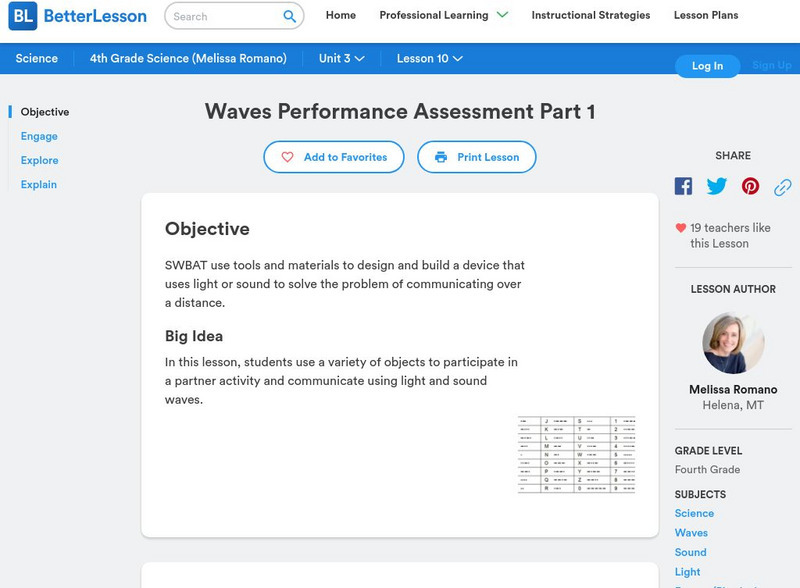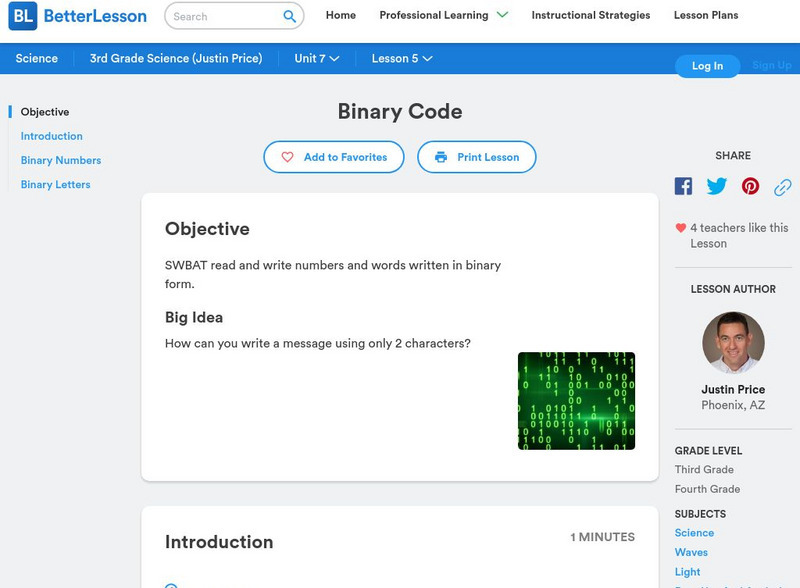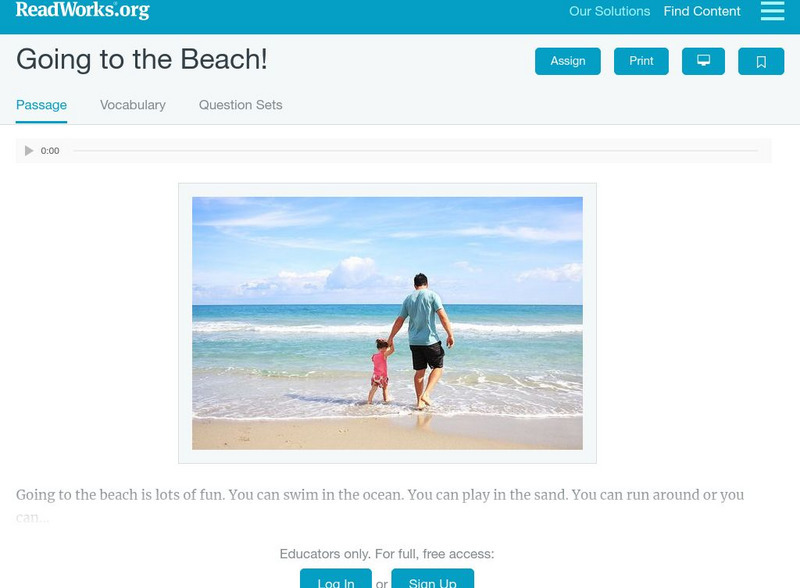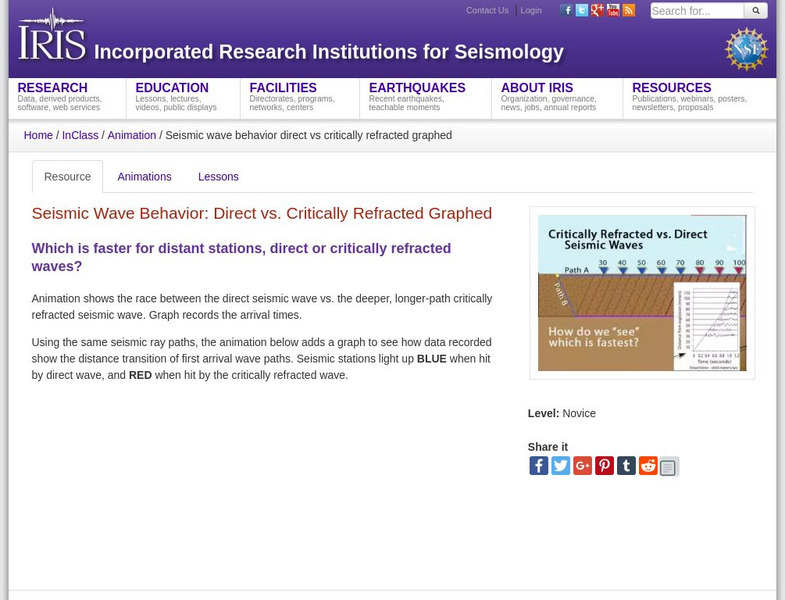Better Lesson
Better Lesson: Catch a Wave
This lesson encourages students to model a wave in a variety of ways using ropes and rubber bands. Resources included are videos of the lesson in action, a student worksheet, and examples of student work.
Better Lesson
Better Lesson: Waves Performance Assessment Part 1
Students will use a variety of objects to participate in a partner activity and communicate using light and sound waves. Resources include a video, pictures and videos of the lesson in action, and examples of student work.
Better Lesson
Better Lesson: Waves Performance Assessment Part 2
Students will use tools and materials to design and build a device that uses light or sound to solve the problem of communicating over a distance. Resources included are videos of the lesson in action, a student worksheet, and an...
Better Lesson
Better Lesson: Binary Code
Students will learn how to write numbers and words in binary form in order to understand that patterns can be used to transfer information. Resources include a video explanation and examples of student work.
Read Works
Read Works: Going to the Beach!
[Free Registration/Login Required] An informational text about all the fun things people can do at the beach. A question sheet is available to help students build skills in reading comprehension.
PBS
Wnet: Thirteen: Savage Earth: Waves of Destruction, a Tsunami Animation
View a brief animation that explains the science behind a tsunami.
Other
Southampton Oceanography Centre: Rossby Waves
This site from the Southampton Oceanography Centre provides an easy-to-understand definition and schematic of a Rossby Wave in the Introduction hyperlink. Also includes information on how to observe Rossby waves in satellite data and a...
Incorporated Research Institutions for Seismology
Iris: Seismic Wave Behavior: Direct vs. Critically Refracted Graphed
Examine the behavior of seismic waves. This graph illustrates direct and critically refracted waves.
Other
Absorb Learning: Properties of Waves
An interactive introduction to the properties of waves with descriptions, animations, and questions.
Other
Byju's: Physics: Reflection of Waves
Explains what happens to a wave when it hits a fixed end or a free end.
Physics Aviary
Physics Aviary: Practice Problems: Wave Properties From Graph 3
Determine the speed of a wave based on reading the vertical position vs. time graph simultaneously with the vertical position vs. horizontal position graph.
Physics Aviary
Physics Aviary: Practice Problems: Wave Equation
This program asks students to determine the variables in a wave equation. Students must determine wavelength, frequency, and amplitude.
Physics Classroom
The Physics Classroom: Waves: Waves and Wavelike Motion
Here is an introduction to the concept of waves and wavelike motion people experience anywhere and everywhere.
Physics Classroom
The Physics Classroom: Waves: What Is a Wave?
Students examine how waves are described in a manner that allows us to understand their basic nature and qualities.
Physics Classroom
The Physics Classroom: Waves: Categories of Waves
This physics tutorial helps students categorize waves based on distinguishing, observable characteristics.
Physics Classroom
The Physics Classroom: Waves: Boundary Behavior
Through illustrated examples, video clips, and practice problems, students explore what happens to waves at the boundary of different mediums.
Physics Classroom
The Physics Classroom: Waves: Traveling Waves vs. Standing Waves
Students discover the difference between traveling and standing waves in this physics tutorial.
Physics Classroom
The Physics Classroom: Second Harmonic: Standing Waves on a String
A reference page that includes content and an animation to explain standing waves, nodes, and harmonics.
Physics Classroom
The Physics Classroom: Third Harmonic: Standing Waves on a String
A reference page that includes content and an animation to explain standing waves, nodes, and harmonics.
Physics Classroom
The Physics Classroom: Fourth Harmonic: Standing Waves on a String
A reference page that includes content and an animation to explain standing waves, nodes, and harmonics.
Physics Classroom
The Physics Classroom:fifth Harmonic:standing Waves on a String
A reference page that includes content and an animation to explain standing waves, nodes, and harmonics.
Other
University of Wisconsin Green Bay: Faults and Earthquakes
This site is primarily set up as an outline and is loaded with graphs, maps, and images. It covers a variety of earthquake-related topics, such as what causes earthquakes, fault lines and structures, seismology, a historical look at...
Physics Aviary
Physics Aviary: Read the Oscilloscope Challenge
Practice reading an oscilloscope. Students must achieve a score or 10 or more. At the end students should be able to get frequency, period, voltage and peak to peak voltage.
Physics Aviary
Physics Aviary: Visualizing the Wave Equation
This program gives students a visual representation of the wave equation. This will let students see how all the different variables come together to create a wave that propagates through space and time.








